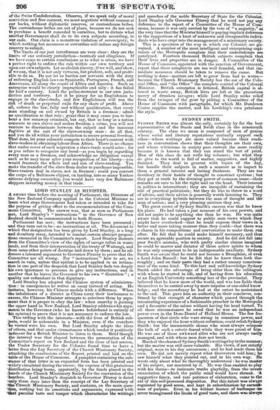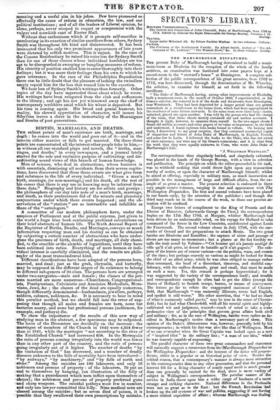SYDNEY SMITH.
SYDNEY SMITH was almost the only., certainly by far the best representative of the Steele and Swift class in the nineteenth century. The class we mean is composed of men of genius whose social and literary reputations mutually support each other—whose writings are more valued because their readi- ness in conversation shows that their thoughts are their own, and whose witticisms in society pass current the more readily because it is known that they can stand the test of print. Men- of this class do not write big volumes ; but what they do give to the world is full of matter, suggestive, and highly finished. They deal in general with topics of the day, but handle their subjects in such a manner as to impart to them a general interest and lasting freshness. They are too desultory in their habits of thought to construct systems ; but they get at truth by the divining power of common sense—their remarks are sure to hit the right nail on the head. Their interest in politics is intermittent; they are incapable of sustaining the role of practical politicians ; but they do like to throw in a word of advice, and their advice is generally worth listening to. They are in everything hybrids between, the man of thought and the man of action ; and a very pleasing mixture they are. The great secret of Sydney Smith's success was that he knew his place. He had taken a just measure of his own powers, and did not aspire to be anything else than he was. He was -quite aware that he could suggest to public men views which they might have overlooked—that he could express their views in -.11 better and more taking manner than they could—that there was a charm in his compositions and conversation to make them run after. He felt that he could make himself necessary, and thus secure an agreeable position in society. And he did not fall into poor Swift's mistake, who with pretty similar claims imagined he could be master and dictator of those active spirits to whom he was only competent to be an indispensable auxiliary. Sydney Smith was aware that he could not become a Brougham, or even a Lord John Russell : but he felt that he knew them both tho- roughly ; and on their parts they had. a rather uneasy conscious- ness of the same kind. To this-tact and self-knowledge Sydney Smith added the advantage of being older than the colleagues with whom he started in life, and of having from his education at an English University something less of the provincial. They believed that he knew more of the world, and was less liable than themselves to be carried away by mere impulse or one-sided know ledge ; and the ascendancy he had at the outset he maintained to the end. This gave him an authority in their conclaves, con- firmed by that strength of character which passed through the intoxicating experience of a fashionable preacher in the Metropolis and a favourite of the salons without having his head turned. To all these circumstances he owed that he was an independent power even in the Dom-Daniel of Holland House. The few fre- quenters of that circle who were strong in conscious power, and they who enjoyed the hour without reflection, could relish Sydney Smith : but the innumerable shams who -must always -compose the bulk of such a coterie feared while they were proud of him. He was one of those awkward allies who are not always easily managed, and with whom men dare not break. Much of the charm of Syd.ney Smith's writings I ay in the manner; but the matter was still more valuable. His views, if not strictly original, were in his day uncommon ; and he had made them-his own. He did not merely repeat what discoverers told him; he saw himself what they pointed out, and in his own way. He wrote only about what he thoroughly understood : he was master of his subject, not mastered by it. He was thus enabled-to play with his theme—to insinuate truths playfully, from the. severe enunciation of which the public mind would have shrunk. A suggestive fancy, and rare patience of elaboration, came to the aid of this-self-possessed disposition. But this talent was always regulated by good sense, and kept in subordination 'by-earnest- ness of purpose. Even in his wildest licence of burlesque he never-transgressed-the limits of good taste, and there was always
meaning and a useful aim in his jokes. Few have pioneered so effectually the cause of reform in education, the law, and our political institutions ; and of all the leaders of Liberal opinion, he alone, perhaps, never stooped to coquet or compromise with the vulgar and mawkish cant of Exeter Hall.
Without that enthusiasm which if it prompts self-sacrifice is unrelenting in its exaction of similar sacrifices from others, Sydney Smith was throughout life kind and disinterested. It has been insinuated that his only two prominent appearances of late years were dictated by selfish motives. This is unjust. In the case of the Capons Residentiary he raised his voiceless for Sydney Smith than for one of those classes whose individual hardships are too apt to be disregarded in sweeping or bungling measures of reform.
• His identity of position enabled him to enter thoroughly into their • feelings ; but it was more their feelings than his own to which he gave utterance. In the case of the Philadelphia Repudiation there can be little doubt that the pleasure of lashing the swindlers amply repaid him for the loss that roused him to the exertion.
We hear less of Sydney Smith's writings than formerly. Other topics of the day have superseded those about which he wrote. His writings have been relegated from the club and coffeeroom to the library ; and age his not yet winnowed away the chaff of contemporary scribblers amid which his wheat is deposited. But his time is coming again. His broad and genial humour, his reality, his shrewd appretiation of character, will insure his Sibylline leaves a share in the immortality of the Montaignes and Steeles Of past generations.



























 Previous page
Previous page